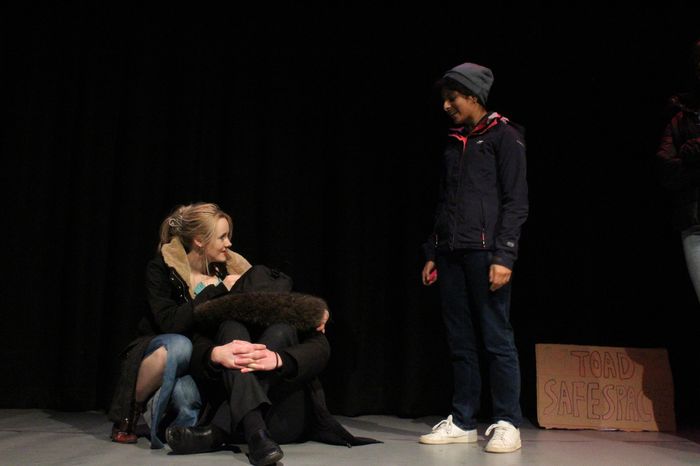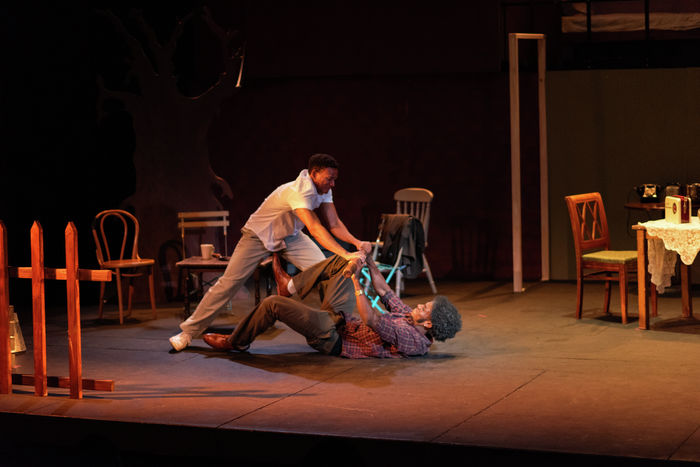To judge or not to judge?
Josh Pritchard investigates the standards we apply to student theatre, and wonders if it is possible to meet them

Student theatre is cursed by its first name. The term ‘student’ is continuously plagued with associations of immaturity, inexperience, and limited resources: perceptions which, subsequently, have haunted student productions. If you were to mention the fact that every aspect of your show is student-led, you may find that your show abruptly becomes less appealing in the eyes of a standard theatre goer. Yet, as someone who’s only been at Cambridge for the past month, I have found myself pleasantly surprised by its theatre scene. The drama of Julius Caesar, the charm of The Footlights and the quiet beauty of Being Friends have all cemented my assurance that the art form is being upheld by talented creatives. Yet, there have been others where I’ve felt that snide comment was perhaps appropriate. Without wishing to name and shame the plays I’ve seen that didn’t reach the highest of expectations, it still feels like a mystery as to how or even if, students should judge the theatrical work of their peers.
“The Cambridge creative is bridled with the expectation of either pitiful amateurism or masterful artistry”
The university’s reputation doesn’t help in the slightest. A few quick clicks on Wikipedia will take you to the list of 162 alumni who have graced the stage and screen with their talent. For the aspiring dramatist, not only is there pressure to imitate the success of Tom Hiddleston, Stephen Fry and Olivia Colman, but to surpass all other theatrical efforts made by students across the UK. My first show in Cambridge – a jolly trip to see The Footlights Tour Show – was also the first time where I became aware of this pressure. The cast highlighted the fact that the last time the Footlights had won the Edinburgh Fringe Comedy Award was in 1981, and riffed on the idea that their Fringe venue had been provided to them as a result of the original cohort’s success – not theirs.
Despite the (very hearty) laughter that this joke generated, it still felt like a sad glimpse into the lofty expectations the group had created for themselves, and as a result, had created for everyone else in the venue. Even backstage at the ADC, where the signature of Ian McKellen resides among the changing rooms, it seems that the ghosts of Cambridge’s theatrical past still haunt its current creatives. There are certainly plays which contain glimpses of the brilliance the university’s alumni seems to promise – the Varsity Theatre Page is your best way to discover these – but there still exists a dichotomy. The Cambridge creative is bridled with the expectation of either pitiful amateurism or masterful artistry, and there does not seem to be a middle ground.
“Fry, Laurie, and Mitchell and Webb did not come to this university as finished products”
That shouldn’t mean, however, that there is no room for criticism. Fry, Laurie, and Mitchell and Webb did not come to this university as finished products and were certainly subject to the same pressures of the theatre scene as their successors. Upholding student theatre to high standards has certainly proved successful in the past, and as such, there is little reason why it should not continue to do so. Cambridge productions are also more blessed than some. The larger ADC shows can hold a budget of up to £6000, and have even exceeded £10,000. In other words, a student show may not be deprived of resources as stereotypes suggest, and there is no reason why we should not reward those pieces of student theatre which do exceed our expectations in the same way we would those which label themselves as ‘professional’. I’ve seen plenty of bad professional plays, just as I’ve seen plenty of good student ones, but the ones which stand out are the pieces which overcome their practical limitations to make the audience believe in the authenticity of what they are seeing. The value of theatre, like all live entertainment, is subjective, but to presume that either student or professional theatre entails a certain level of quality is entirely untrue.
The pressures for Cambridge creatives to compete with professionals will likely never cease, but this is not entirely a bad thing. Doing so will inevitably result in some great art, but there equally should be room for all artists to make mistakes and to grow. It’s a university after all.
Some parting advice for student creatives: the first few minutes of your play are everything. Within those minutes, the audience has judged everything: your set, your script, your quality of performance, and whether they will need an extra drink to make it through the night. That is not to say the audiences in Cambridge are hostile. In fact, I would argue student audiences are among the best audiences you can have. We will laugh at anything. We have been sweating over our books for the past 13 hours, crying over our bank balances and sprinting from lecture to supervision to lecture – we need a break. God bless you, you lovely creatives, for having to throw in weeks of rehearsals on top. But don’t trust the audience if you’re looking for critical feedback. We’re probably not in a good state. But also, don’t worry about the people who say your new script “isn’t Shakespeare”. Obviously. Shakespeare didn’t have a degree to do.
 News / Clare Hall spent over £500k opposing busway 24 December 2025
News / Clare Hall spent over £500k opposing busway 24 December 2025 Comment / The ‘class’ of Cambridge24 December 2025
Comment / The ‘class’ of Cambridge24 December 2025 News / Caius mourns its tree-mendous loss23 December 2025
News / Caius mourns its tree-mendous loss23 December 2025 Comment / League tables do more harm than good26 December 2025
Comment / League tables do more harm than good26 December 2025 News / Girton JCR publishes open letter expressing solidarity with Palestine25 December 2025
News / Girton JCR publishes open letter expressing solidarity with Palestine25 December 2025











